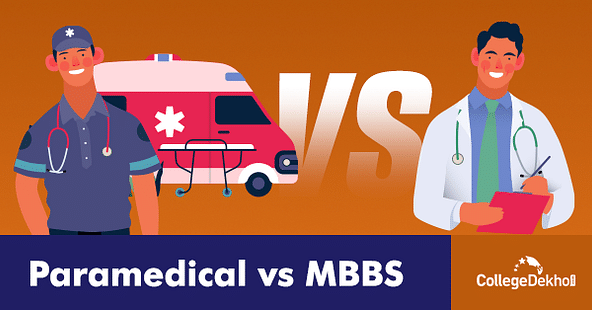While MBBS deals with the practice of medicine, paramedical is a field that is related to the provision of emergency medical treatment. Both the courses offer great career prospects. Read here to know about MBBS vs Paramedical courses.
- Paramedical Vs MBBS – An Overview
- Paramedical Vs MBBS – Eligibility Criteria
- Paramedical Vs MBBS – Admission Process
- Paramedical Vs MBBS – Average Course Fee
- Paramedical Vs MBBS – Scope in India
- Paramedical Vs MBBS – Career Opportunities
- Paramedical Vs MBBS – Key Skills Required
- MBBS Vs Paramedical Courses – Job Profile & Salary Structure
- Paramedical Vs MBBS – Top Recruiters
- Top MBBS Colleges in India
- Top Paramedical Colleges in India
- Faqs

Paramedical courses and MBBS are both viable paths for those interested in pursuing a career in healthcare. While MBBS is the traditional route to becoming a medical doctor, paramedical courses offer an alternative that is less demanding in terms of time and resources. However, the question remains: which has a better scope for career growth and job opportunities? In this article, we will compare and contrast the two paths i.e Paramedical Vs MBBS and explore their respective advantages and disadvantages.
Paramedical Vs MBBS – An Overview
MBBS full-form stands for Bachelor of Medicine and Bachelor of Surgery. It is a 4.5-year UG program dealing with the science of medicine and surgery. Following four and a half years of academic training and a 1-year internship, aspirants can go on to become a doctor or a surgeon in a specialized field. NEET or National Eligibility cum Entrance Test is the only entrance exam through which aspirants can get admission to MBBS colleges in India.
Paramedical courses, on the other hand, deal with the treatment and diagnosis of different diseases, and health problems using clinical labs, diagnostic tools, X-rays, ultrasound, etc. The course includes topics from Physiotherapy and Nursing to Rural Healthcare and Ophthalmic Technology.
Top 10 Paramedical Courses After 12th in India
Here is a list of the top 10 paramedical courses to pursue after the completion of 12th grade in India:
B.Sc (Hons) in Nursing
B.Sc in Cardiac Technology
B.Sc in Anaesthesia
B.Sc in Neurophysiology Technology
B.Sc in Occupational Therapy
B.Sc in Audiology & Speech Therapy
B.Sc Optometry
B.Sc in Radiology
Bachelor of Physiotherapy
Admission to paramedical courses is usually conducted through entrance exams or on the basis of merit, varying from one institute to another.
Paramedical Vs MBBS – Eligibility Criteria
For admission to both Paramedical and MBBS courses, the minimum age criteria is 17 years. Furthermore, aspirants are required to score at least 50% aggregate in Science subjects (Physics, Chemistry & Biology) in the 10+2 examination or equivalent from a recognized Board to be able to qualify based on entrance exam or merit.
Paramedical Vs MBBS – Admission Process
Admission to paramedical courses in India is majorly done through entrance exams. There are some colleges that offer admission to these courses on a merit basis as well.
On a national level, NEET UG entrance examination is conducted to provide admission to MBBS courses at different medical institutes in India. It is important for candidates to crack the exam as there are almost no colleges in India that offer direct admission to MBBS.
Paramedical Vs MBBS – Average Course Fee
When it comes to paramedical vs MBBS course fee comparison, students must know that the average course fee for MBBS programs varies among private, government and deemed universities. While it can range from INR 20,000 to INR 7.5 lakhs in Government colleges, it can go up to INR 20 lakh and beyond for private colleges in India.
Course Name | Type of Institute | Average Course Fee (Annual) |
|---|---|---|
MBBS | Government/Public | INR 20,000 – INR 7.5 Lakhs |
Private | >INR 20 Lakhs |
Paramedical course fees depend on the particular course opted for. The table below shows the names, duration and average course fees for the most popular paramedical courses after the 12th Class:
Course Name | Duration | Average Course Fee (Annual) |
|---|---|---|
Diploma in Physiotherapy | 2 years | INR 1 Lakhs – INR 3 Lakhs |
B.Sc in Dialysis Therapy | 3 years | INR 1 Lakhs – INR 2 Lakhs |
B.Sc (Respiratory Therapy Technology) | 3 years | INR 2 Lakhs – INR 4 Lakhs |
BSc Ophthalmic Technology | 3 years | INR 2 Lakhs – INR 6 Lakhs |
BSc in Audiology and Speech Therapy | 3 years | INR 4 Lakhs – INR 5 Lakhs |
BSc Radiology | 3 years | INR 2 Lakhs – INR 10 Lakhs |
Bachelor of Physiotherapy | 3-5 years | INR 4 Lakhs |
Bachelor/BSc in OTT | 3-5 years | INR 4 Lakhs |
BSc Nursing | 4 years | INR 1 Lakhs – INR 2 Lakhs |
BNYS Course | 5 years | INR 1 Lakhs – INR 2 Lakhs |
Paramedical Vs MBBS – Scope in India
Over the years, the scope of paramedical courses in India has stretched. Earlier, the branch of medicine was not recognized much due to poor career prospects and low payscale. However, the demand for paramedics seems to be increasing in both government and private hospitals these days. The major areas of employment after pursuing a paramedical course are listed below:
Hospitals
Colleges
Nursing Homes
Armed Forces
Research Laboratories
Railways
Research Areas
NGOs
Business Organizations
The scope of MBBS, on the other hand, is far-stretched as it is one of the most coveted degrees for medical aspirants. After the completion of the 5.5-year program, students can get jobs in any of the following fields:
Hospitals
Nursing homes
Health centres
Medical colleges
Biomedical companies
Laboratories
Biotechnology and Pharmaceutical companies
Also Read: Explore Paramedical Courses in India - Career Opportunities, Admissions and More
Paramedical Vs MBBS – Career Opportunities
The healthcare industry is fast-growing and constantly in need of trained and skilled paramedics in private and government hospitals, nursing homes, and other healthcare institutions. Due to this, there has been a significant rise in the number of job opportunities paying aspirants a handsome salary.
- Emergency Medical Technician (EMT): EMTs provide basic life support to patients in emergency situations, including administering first aid, providing oxygen, and transporting patients to hospitals.
- Radiologic Technologist: Radiologic technologists use x-rays and other imaging technologies to diagnose and treat patients.
- Physiotherapist: Physiotherapists work with patients to improve their mobility, manage pain, and restore physical function after an injury or illness.
- Occupational Therapist: Occupational therapists work with patients to help them regain their ability to perform daily activities, such as dressing, grooming, and eating.
- Speech Therapist: Speech therapists help patients with speech and language disorders, such as stuttering or difficulty with pronunciation.
- Cardiovascular Technologist: Cardiovascular technologists assist cardiologists in diagnosing and treating patients with heart conditions.
- Anesthesia Technologist: Anesthesia technologists assist anesthesiologists in administering anesthesia to patients before surgery.
- Dialysis Technician: Dialysis technicians operate and maintain dialysis equipment used to treat patients with kidney disease.
- Medical Laboratory Technician: Medical laboratory technicians analyze and test body fluids, such as blood and urine, to diagnose diseases and conditions.
- Respiratory Therapist: Respiratory therapists work with patients with breathing disorders, such as asthma or emphysema, to help them breathe more easily.
The most popular career option after MBBS is to practice as a doctor either privately or at a hospital/nursing home. Medical professionals can also choose to pursue higher studies or research and go on to build a career in academics.
A career in MBBS is very rewarding in terms of scope and salary package. Here are some of the most prominent job profiles that one can go for after an MBBS course:
- Medical Practitioner/General Practitioner: Medical practitioners provide primary care to patients and diagnose and treat a range of illnesses and conditions.
- Surgeon: Surgeons perform operations on patients to treat injuries, illnesses, and deformities.
- Anesthesiologist: Anesthesiologists administer anesthesia to patients before surgery and monitor patients' vital signs during the procedure.
- Cardiologist: Cardiologists diagnose and treat patients with heart conditions, such as arrhythmia or heart disease.
- Neurologist: Neurologists diagnose and treat patients with neurological disorders, such as Parkinson's disease or epilepsy.
- Pediatrician: Pediatricians provide primary care to infants, children, and adolescents and diagnose and treat a range of illnesses and conditions specific to children.
- Obstetrician/Gynecologist: Obstetricians and gynecologists specialize in women's health, providing care related to pregnancy, childbirth, and reproductive health.
- Oncologist: Oncologists diagnose and treat patients with cancer and work with other healthcare professionals to develop treatment plans.
- Psychiatrist: Psychiatrists diagnose and treat patients with mental health conditions, such as depression or anxiety.
- Radiologist: Radiologists use imaging technologies, such as x-rays and MRI, to diagnose and treat patients with a range of conditions and diseases.
Candidates can compare Paramedical vs MBBS employment areas and job profiles in the table below before making a choice:
Course Name | MBBS | Paramedical Courses |
|---|---|---|
Employment Areas | Hospitals Nursing Homes Laboratories Medical Colleges Biomedical Companies Health Centres Personal Clinic Research Laboratories Biotechnology Companies Pharmaceutical Companies | Hospitals Nursing Homes Colleges Research Laboratories Armed Forces Railways NGOs Research Areas Business Organisations |
Job Profiles | Junior Doctor Junior Surgeon Doctor Researcher Medical Professor Lecturer General Surgeon | Audiologists Medical Laboratory Technologist Rehabilitation Worker |
Paramedical Vs MBBS – Key Skills Required
Regardless of the career path you choose, aspirants from both the Paramedical and MBBS fields require a set of skills apart from the academic degree to be able to serve in the respective healthcare sector. Here is a look at the required skill set for MBBS and Paramedical jobs in India:
Key Skills for MBBS Jobs | Key Skills for Paramedical Jobs |
|---|---|
|
|
MBBS Vs Paramedical Courses – Job Profile & Salary Structure
The pay scale or salary after MBBS vs Paramedical courses depends on one’s experience in the field job role and skills. The starting salary of an MBBS graduate can range from INR 2.4 LPA to INR 5.7 LPA. For someone in a senior position, the salary can range from INR 12.8 LPA to INR 50 LPA.
The initial salary structure for paramedics can range from INR 2.2 LPA to INR 12 LPA. The package will increase with more experience. Paramedics in the senior position can earn up to INR 40 LPA.
With various industries and top recruiters available, here are some of the MBBS job roles, along with the packages offered to them.
Candidates can refer to the table below to get an idea of the annual package of MBBS and Paramedical professionals based on the top job profiles:
MBBS Salary Structure | |
|---|---|
Job Profile | Average Annual Package (INR) |
Dietician | INR 5 LPA |
Paediatrician | INR 5.4 LPA |
General Physician | INR 6 LPA |
Medical Officer | INR 7 LPA |
Surgeon | INR 10 LPA |
Paramedical Salary Structure | |
Job Profile | Average Annual Package (INR) |
Medical Lab Technician | INR 2.1 LPA |
OT Technician | INR 2.5 LPA |
Nurse | INR 2.6 LPA |
Occupational Therapist | INR 3.2 LPA |
Audiologist | INR 3.8 LPA |
MRI Technician | INR 3.8 LPA |
Radiologist | INR 7.5 LPA |
Also Read: List of Top Paramedical Entrance Exams in India
Paramedical Vs MBBS – Top Recruiters
Here is a list of recruiters offering lucrative packages to MBBS and Paramedical aspirants after the completion of the courses:
Top Recruiters for MBBS | Top Recruiters for Paramedics |
|---|---|
AIIMS | CARE Hospitals |
Medanta Hospitals | Shri Mahant Indiresh Hospital |
Apollo Munich Health Industries Co Ltd | Unity Health Complex |
Fortis Healthcare Pvt | |
Cipla Ltd | |
Religare Health Insurance Company Ltd | |
Apollo Hospitals Enterprises Ltd | |
Lilavati Hospital and Research Centre |
Top MBBS Colleges in India
Listed below are some of the most popular MBBS colleges in India where aspirants can seek admission based on NTA NEET results. The average fee structure for these colleges is also mentioned below:
Name of College/Institute | Average Annual Fee Structure |
|---|---|
INR 2 Lakhs to 3 Lakhs | |
INR 17 Lakhs | |
University College of Medical Sciences – University of Delhi | INR 20,000 to INR 30,000 |
Institute of Medical Sciences – Banaras Hindu University | INR 65,000 to INR 70,000 |
INR 6,000 to INR 10,000 | |
INR 25,000 | |
INR 6 Lakhs to 7 Lakhs |
Top Paramedical Colleges in India
Considering the demand for Paramedics in private hospitals is high, here is a look at some of the top Paramedical colleges in India:
Name of College/Institute | Average Annual Fee Structure |
|---|---|
INR 1.96 Lakhs to INR 3.32 Lakhs | |
INR 25,000 to INR 1 Lakh | |
INR 20,000 to INR 70,000 | |
INR 30,000 to INR 70,000 | |
INR 25,000 to INR 65,000 | |
NA | |
Jagannath Institute of Management Sciences - (JIMS) Sector-3 Rohini, Delhi | INR 90,000 to INR 1.3 Lakh |
NA | |
NA | |
INR 3.39 Lakh to INR 4.83 Lakh | |
INR 4.64 Lakh to INR 7.04 Lakh |
If you wish to apply for admissions in the colleges mentioned above or need details on the same fill out our common application form.
These were the major differences between MBBS and Paramedical courses and their career prospects. If you have any questions regarding paramedical or medical education in India, ask away your queries through our Q&A section on the CollegeDekho website.


















Similar Articles
NEET 2024 Cutoff for Rajasthan - AIQ and State Quota Seats
Bihar NEET Cutoff 2024: Check Closing Ranks for MBBS/BDS Admission and Previous Year' Cutoff
NEET 2024 Cutoff for MP - AIQ and State Quota Seats
NEET UG 2024 Exam Day Instructions
NEET 2024 Cutoff for BAMS: General, OBC, SC, ST Category
NEET 2024 MBBS Seats in Government Medical Colleges